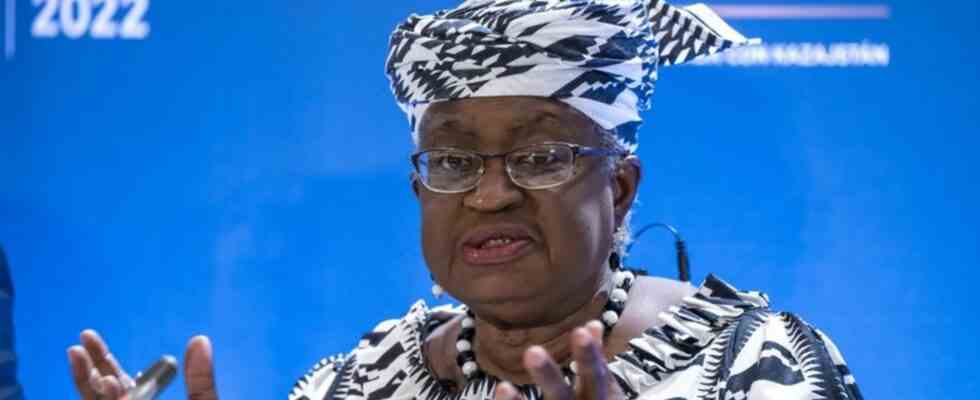world trade
WTO breaks through on patents and fisheries
WTO chief Ngozi Okonjo-Iweala has reached an agreement and is receiving a belated birthday song. Photo: Martial Trezzini/KEYSTONE/dpa
© dpa-infocom GmbH
After years of fruitless wrangling, the WTO has reached agreements in the dispute over corona patents and fisheries. But nobody is really happy.
After a long struggle, the 164 members of the World Trade Organization (WTO) have reached an agreement to expand the production of corona vaccines.
Governments should temporarily be able to circumvent patents from pharmaceutical companies more easily in order to save lives. While the federal government expressed satisfaction with the early morning breakthrough, both the pharmaceutical industry and civil society groups have criticized the agreement.
An agreement against harmful fisheries subsidies was also reached. However, a controversial sub-area had to be excluded for the time being. In addition, the ministers extended an agreement not to levy any tariffs on cross-border digital trade – for example on streaming services. Trade ministers pledged to limit the use of export restrictions in a statement on food security and adopted a roadmap for reforms at the WTO.
“You don’t go home empty-handed”
It was the first time in years that the WTO had struck an agreement. The organization threatened to sink into insignificance. The then US President Donald Trump wanted to resign. When this conference threatened to fail as well, WTO boss Ngozi Okonjo-Iweala pushed through an extension on Wednesday. “You don’t go home empty-handed,” said the 68-year-old at sunrise on Friday. “The WTO has demonstrated that it is capable of responding to the challenges of our time.”
For the German export industry, the priorities lay elsewhere: they insisted on the restoration of the partly paralyzed dispute settlement procedure and on reforms of the WTO rules. It’s about dealing with state-owned companies like those in China, which compete on the world market. Both are to be tackled in the next two years. With the decision, the conference “just barely avoided complete failure,” said Volker Treier, head of foreign trade at the Association of Chambers of Industry and Commerce (DIHK). The multilateral WTO system as the basic framework for world trade and the international division of labor is indispensable. The German government must get more involved.
threatened with loss of importance
It was the first time in years that the WTO had struck an agreement. The organization threatened to sink into insignificance. The then US President Donald Trump wanted to resign. When this conference threatened to fail as well, WTO boss Ngozi Okonjo-Iweala pushed through an extension on Wednesday. “You don’t go home empty-handed,” said the 68-year-old at sunrise on Friday. “The WTO has demonstrated that it is capable of responding to the challenges of our time.”
The Federal Ministry of Economics praised the patent agreement, known as “trips waiver” – i.e. restrictions of the trip agreement on intellectual property. Governments could thus issue compulsory licenses for the production of Covid-19 vaccines against the will of pharmaceutical companies without generally questioning the protection of intellectual property, as German State Secretary Udo Philipp said. Compulsory licenses were also possible before, but they now go a little further in some areas.
The pharmaceutical association IFPMA expressed disappointment. It is a dangerous signal to science. Full patent rights are necessary to bring about innovations. The German pharmaceutical industry made a similar statement. “Here, patent law is used politically instead of tackling the problems that really exist,” said Han Steutel, President of the Association of Research-Based Drug Manufacturers. The production of the corona vaccines is no longer the problem. Rather, there is an oversupply. Relaxing patent protection would only result in more stock being produced.
The Mainz-based corona vaccine manufacturer Biontech explained that patents are not the “limiting factor” for the production or supply of vaccines. The company currently has additional vaccine in stock. More important than the patent issue is the development of a supply chain that includes the manufacture, distribution and education about the drugs. “That’s why Biontech is working on building up regional production capacities,” emphasized the Mainz-based company. The construction of the first production facility in Africa will officially start next week in Rwanda and will be jointly managed by governments and international and national organizations.
Companies often invest years in drug and vaccine research. Only a fraction are successful. The companies then want to earn money with the products through license protection.
Criticized as ineffective
Organizations such as the People’s Vaccine Alliance or Oxfam, on the other hand, criticized the agreement as ineffective, also because it only includes vaccines and no medicines and diagnostics. Due to the many conditions, little was left of the original demand for the patents to be revoked. “It is shameful that WTO members would prioritize trying to save a ailing institution and obscene corporate profits over saving lives,” said Melinda St. Louis of Public Citizen. The EU in particular has blocked a genuine repeal of patent rights.
Doctors Without Borders also see little benefit: “The measures will neither take action against pharmaceutical monopolies nor ensure affordable access to life-saving medical aids.”
The fisheries agreement has been negotiated for more than 20 years. Subsidies for illegal and unregulated fishing should be banned. Other subsidies that contribute to overfishing are to be renegotiated. “Nevertheless, in the end we managed to find a compromise that all 164 WTO members could bear and thus make an important contribution to sustainability in global fisheries,” said State Secretary Philipp. Pew Charitable Trusts, an organization committed to sustainable fishing, was pleased. It is a turning point in the fight against one of the main causes of global overfishing.

